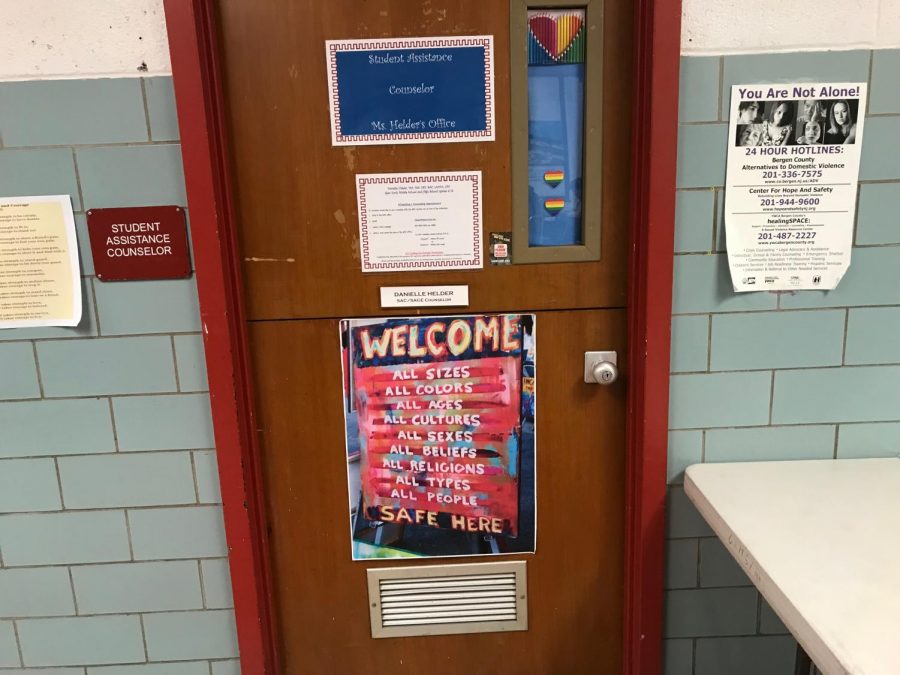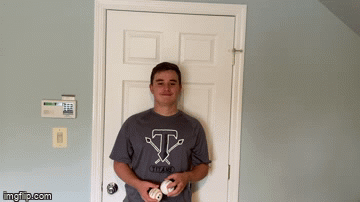Q&A with Student Assistance Counselor Danielle Helder
Photo Credit: Rob Zamparelli
Ms. Helder Office located in the Senior hallway.
January 29, 2020
Rob Zamparelli: What do you do here at Glen Rock?
Danielle Helder: The title is Student Assistance Counselor. But it’s a little different than a typical… it’s called a SAC position. It’s a little different than probably other SACs and other districts because I’m not hired by Glen Rock. I’m hired by Sage Thrive, which is a therapeutic school, who places their clinicians in schools to be able to do therapy.
Rob Zamparelli: How long have you been here at GRHS for?
Danielle Helder: This is my 5th year here at Glen Rock.
Rob Zamparelli: How did you get into this job?
Danielle Helder: I started off as a school psychologist. My first job well, as your school psychologist, you have to do your internship. Alright, so the very first thing you do a full year, basically working for free as an intern. I worked in Verona and I worked in all the different schools from preschool through high school. My first hire job was at West Essex Regional High School, actually was in junior high school, but I saw kids grades seven through nine at that time, it’s sort of like it was a cross between middle school and high school because you have the ninth graders as well. That was my first job as a school psychologist.
And then after West Essex, I decided or I learned from my experience at West Essex. So typically, the job of school psychologist, I don’t know if you know anything about the child study team or what they do but there’s a lot of paperwork, there’s a lot of testing. There’s a lot of case management and I also had a counseling group of about 12 kids who had emotional behavioral difficulties. And I realized I love counseling. And so after West Essex, I was offered a job at the Craig School, which is a private school for kids with disabilities.
So they asked me to create the position of a school psychologist, social clinician. So from there, I started doing groups , I did a lot of different things. I did a psychology club where we would watch movies and diagnose the characters in the movies. I would do individual counseling, crisis and I also taught like a social skills class, but it was more a combination of counseling and instruction at the same time, where it was very in the minute instead of like teaching about what was happening.
And I was there for a while. And then I realized that I wanted to start doing private practice. So I went back to grad school. So for the first part of it is that I have a master’s in psychology, and I’m certified as a school psychologist. At that point, I then went back to grad school, and I got a second Master’s in clinical mental health. And I also certified as a SAC . I also got two licenses, my licensed professional counselor with the clinical mental health, and I’m also a licensed clinical Alcohol and Drug counseling.
Rob Zamparelli: How do kids get in contact with you?
Danielle Helder: Okay, so my position is also different in the fact that there are two other stage counselors here. But they purely work with kids who have counseling in their IP’S. And because it’s in their IEP parents, know, they’re getting counseling. Exactly. My position is different where I would say 90 something percent of the kids I see parents have no idea. So kids knock on my door, they send me emails, or they get referred by maybe their guidance counselor or maybe an administrator.
Rob Zamparelli: What are some challenges about your job?
Danielle Helder: I think that the reason why we wanted one this to be a safe place where kids can kind of talk about what is going on with them without any fear of any repercussions, exactly right to have confidentiality and for them to kind of figure things out on their own. And they really dictate how often they want to see me. Some kids will see me weekly, some kids will just do a check in sometimes something’s going on and they’ll see me multiple times a week, some kids will come for something and then I don’t hear from them until something else happens. So that is one of the benefits of it being the confidentiality and parents but then there’s other situations where, for example, kid might need to see somebody outside of school. Right? And at that point, I try and empower the kids To communicate with the parents about their needs. I always especially tell the high school kids. It’s not my place. And to tell your parents what you’re thinking feeling versus us having a conversation together. There’s only some exceptions to confidentiality when there’s imminent danger or harm. Otherwise, in those cases, I have legally no option but to report.
Rob Zamparelli: What is your favorite part about your job?
Danielle Helder: There’s so many good parts of my job,I think seeing a kid changing grow and feel better about themselves. I’ve seen kids who have come in feeling really depressed, where they don’t really like themselves, and then come and just feeling very closed off and coming in here and opening up and feeling safe and saying things that they think nobody will understand. And just a change in their confidence and a change and how they feel about themselves.
Rob Zamparelli: What are you doing when your not meeting with kids?
Danielle Helder: On any kind of any given day, I don’t know what’s gonna happen. Like, for example, sometimes I even get an email from a kid at two o’clock in the morning on a Sunday saying I need, I need to see you tomorrow, you know, so that could change. It could be a crisis that can happen. I’m also which is funny because a lot of people, if they think that they think oh, all she does is substance, but if there’s something related to something, I’m the person whose credentials to be able to deal with that so if a kid has to be sent out. I’m the one who’s called to, you know, talk to the kid and kind of that whole procedure. There’s, you know, there’s a lot of interventions and that kind of thing that’s happening and sometimes it’s even kind of collaborating with others. Also there’s a programming part of my job, so a lot of time when there are assemblies, or workshops. I’m arranging that like things rejoined the hall classrooms. Yeah. I’m often involved in not, not this year, but in the past, I’ve gone into the psychology classrooms, and I have taught lessons in the psychology classroom. And so whenever I have an opportunity to be outside of here, I try and take advantage of that.
Rob Zamparelli: Anything else you would like to share?
Danielle Helder: I think that there’s a stigma about mental health or, you know, seeking therapy. Yeah. And that it actually courage takes courage and strength to go for help. Yeah. And it’s probably the healthiest thing that someone can do. Because the people are in therapy, they’re working through their things. There isn’t a person who doesn’t have stress, who doesn’t have some kind of issue or hasn’t, you know, had some kind of disappointments or pains in their past. And so it’s healthy to be in therapy to have someone hear you and understand you. And it doesn’t make you weak. And it doesn’t make mean that there’s something wrong with you. And, unfortunately, especially in this district, we have a lot of very high functioning kids who often have a smile on their face and they’re getting good grades, but underneath it all they don’t necessarily feel good and they’re not seen and because they’re not the problem, kid. And yes, there feeling really bad about themselves? Or they’re feeling on a regular basis stressed out or not sleeping or just on a day to day basis, not really having any joy.




